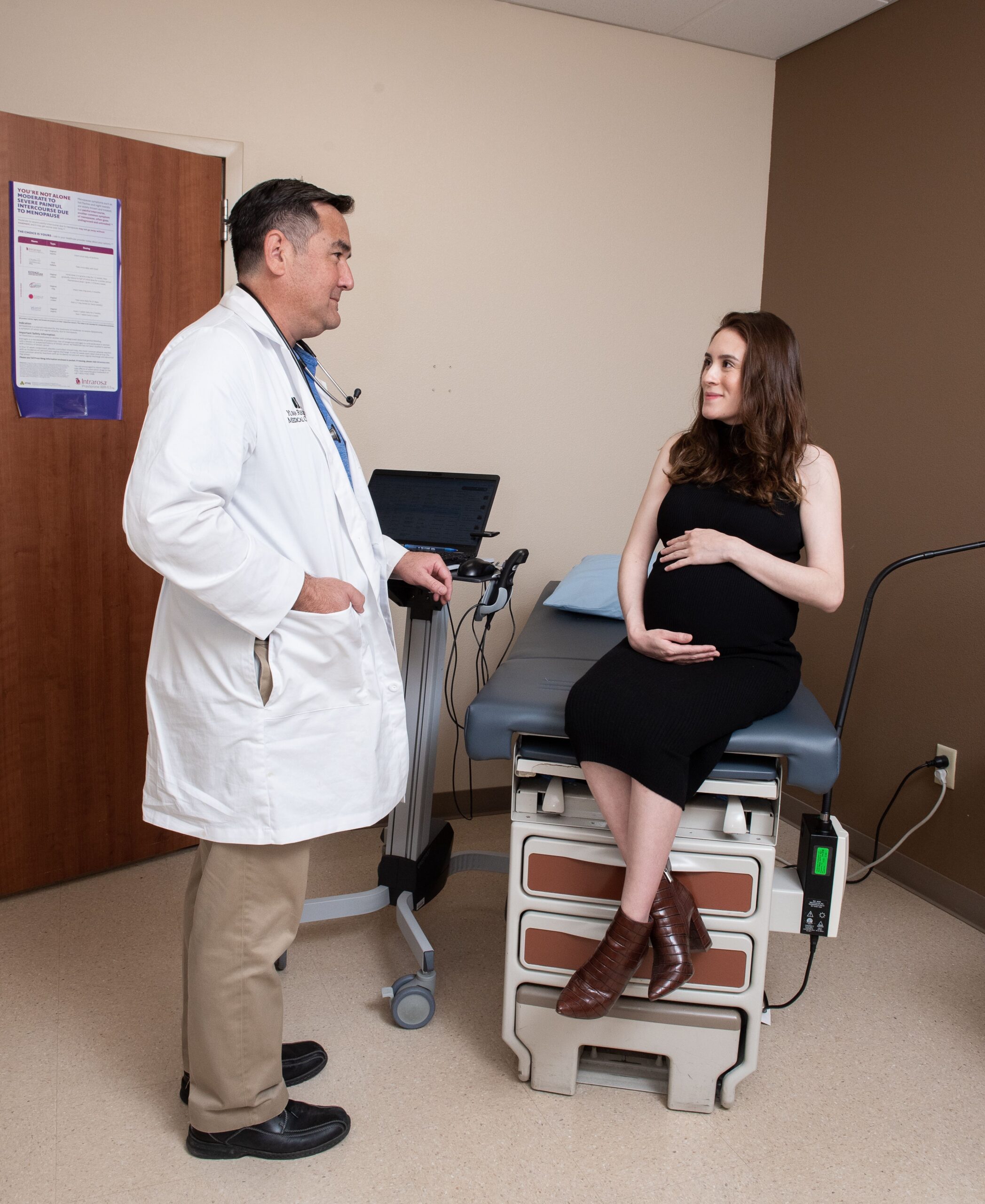Your pregnancy is a special journey filled with moments to treasure.
Pregnancy and motherhood are exciting, exhausting and joyful all at once. We know this is a cherished journey, yet we also understand that pregnancy isn’t always easy. That’s why we provide the personalized care you will need throughout your pregnancy and childbirth.
Your care team will provide care and support for a birthing experience that is safe, special and memorable – whether it is a natural childbirth, epidural-assisted or c-section. For example, if you wish to have a water birth, our Labor and Delivery/Mother Baby Unit team will work with you to make it happen. Or perhaps you would prefer a “gentle c-section,” whereby mom and baby begin bonding immediately after birth.
Our all-inclusive Labor and Delivery/Mother Baby Unit means you can receive all your care in one location, including emergency care if needed. The Labor and Delivery Unit features nine rooms reserved for labor and delivery and a seven-bed triage area. Our Mother Baby Unit features 23 rooms designed to keep you and your baby together and continue bonding.
In our triage area, we evaluate pregnant or laboring moms unless they present a medical condition requiring emergency room services such as cardiac symptoms or trauma. Here, our providers will make a decision to either treat symptoms in triage, admit the patient or send the patient home.
Ensuring the safety and security of your baby and every baby in our care is our top priority. You and your baby will have matching ID bands for frequent checks. Labor and Delivery/Mother Baby Unit is also a secure unit. In accordance with our Visitor Policy, two visitors, 16 years or older (beyond your spouse, partner) are allowed at a time. These guidelines exist to help promote your safety, security and recovery.
We also provide these services to ensure exceptional care for moms and newborns:
- An anesthesiologist available 24/7
- A Certified Nurse Midwife and OB Laborist on the unit 24/7
- Specialized care during pregnancy emergencies offered 24/7
- A Level A III Neonatal Intensive Care Unit (NICU)
- Lactation consultants to help with successful breastfeeding
- Breastfeeding support beyond your hospital stay
- Education classes and support programs for pregnant and new moms
- Newborn photography services available from Taylor Pait Photography
Pregnancy can be a time filled with questions and uncertainties. Take a quick tour of our Labor and Delivery/Mother Baby Unit to see where you and your baby will be cared for.
Providers
Your care team may include board-certified OB/GYNs, nurses, nurse practitioners, certified nurse midwives and other clinicians.
Locations
Services
Delivering babies is a specialty for us, with more than 3,000 babies born yearly. Yet we know the most important birth experience is your own. We have expertise in the support, guidance and care you need as you prepare to welcome your new baby. Available services include, but are not limited to:
Starting prenatal care early — even before you get pregnant — will benefit your health and that of your baby. When your pregnancy is confirmed, your doctor’s office will set a schedule for office visits based on your individual needs. The frequency of your appointments will typically increase as your pregnancy progresses.
Prenatal care enables doctors to detect and treat any possible health concerns for mom or baby early, before they become more serious. During your first visit, your doctor will learn about your health history and that of your family, do a complete physical exam, take blood and urine samples, calculate your due date and answer any questions you may have. He or she may also make recommendations regarding lifestyle changes, maintaining a healthy diet and prenatal vitamin supplements. Your doctor will continue to monitor your blood pressure and weight gain and check the baby’s growth and heart rate over the weeks and months of your pregnancy. You may also have additional blood work and ultrasound testing to monitor the health of your baby.
Providers at Yuma Regional Medical Center include doctors who specialize in obstetrics and gynecology (OB/Gyn) as well as perinatalogists, or maternal-fetal medicine specialists, for patients with high-risk pregnancies. In addition, certified nurse midwives and nurse practitioners complement and supplement the care of your doctor. Search our provider directory to find someone that fits your needs.
When planning childbirth, many moms-to-be want labor to proceed naturally, with as few medical interventions as possible. At the same time, you may want the peace of mind in knowing that life-saving care is close at hand, if needed. We offer the best of both worlds: support for your natural childbirth combined with the modern technologies available at the hospital. While natural childbirth can be more painful, there may be some benefits for you. You may be able to get up and move around more quickly, avoid the need for a urinary catheter and recover faster.
There are many reasons your doctor may recommend a c-section, or cesarean section, including the size or position of your baby or other factors such as a previous c-section or abdominal surgery. Please note that in order to protect the health and safety of our patients and babies, we do not offer early elective c-section deliveries if there is no medically valid reason. If your doctor does advise a c-section for your delivery, rest assured that you and your baby will receive the highest standard of care at Yuma Regional.
When c-section is the decision for your delivery, your doctor’s office will contact Labor & Delivery to schedule a date and time that works for you based on your pregnancy journey. You may be asked to visit hospital preadmissions to complete paperwork and lab tests. On the day of your scheduled delivery, you will check in at the hospital’s Labor & Delivery department two hours in advance. Your care team includes a physician assisted by specialized nurses and staff members. Most new moms stay in the hospital for 48 hours following a c-section delivery.
It is sometimes necessary to induce labor to protect the health of mom and baby. Your doctor may decide to induce labor for a number of reasons, such as the size of your baby, going beyond your due date or a medical condition for mom such as high blood pressure.
Should the decision to induce be made, your doctor’s office will contact our Labor & Delivery department and request a date for induction. You will be asked to call Labor & Delivery one hour in advance of your scheduled induction time to ensure room availability. Please keep in mind that women in active labor and those who are experiencing emergencies will take precedence. An alternate time will be scheduled if a room is not available at your scheduled time.
The time after induction until delivery can vary based on your condition and circumstances. You will receive personalized care and support throughout your childbirth experience.
Maternal-fetal medicine doctors specialize in high-risk pregnancies and prenatal diagnoses. They provide compassionate, specialized and advanced management of complex pregnancies for women and unborn babies.
Pregnant women with chronic conditions such as heart or kidney disease, diabetes or hypertension, or those at risk for pregnancy-related complications may be referred to a maternal-fetal specialist for consultation or ongoing or intermittent care. If your unborn baby is at risk due to chromosomal or congenital abnormalities, maternal disease, infection, genetic disease or growth restrictions, you may also see a maternal-fetal specialist. In addition, women who experience difficulty conceiving may be referred to a maternal-fetal specialist.
During pregnancy, should a complication arise, a maternal-fetal specialist may meet with you intermittently or become the primary obstetrician for the length of the pregnancy. After delivery, maternal-fetal specialists may follow up and monitor medical complications as needed.
Our neonatologists and NICU staff are always available for newborns who need more advanced care and attention.
If you are struggling with infertility and need help getting pregnant, there are treatments that can increase your chances to conceive. Seek help from your doctor if you’ve been unable to conceive within a reasonable period of time. Depending on your unique circumstances, today’s advanced technologies and techniques offer numerous diagnostic options to determine the cause(s) of your infertility, including laparoscopy or hysteroscopy. Fortunately, there are many safe and effective treatment therapies, including medications to help with hormones and ovulation sometimes combined with minor procedures and assisted reproductive technologies (ARTs) — such as IUI (intrauterine insemination), GIFT (gamete intrafallopian transfer) or IVF (in vitro fertilization).
It is natural to grieve the loss of a pregnancy, and the grieving process can be overwhelming and long — from a few months to a few years. You may experience feelings of shock, disbelief, anger, sadness, guilt, loss of self-esteem, loneliness or depression. Your partner may also be grieving, although he may deal with it differently. Feelings can be even more intense for couples who have had difficulty conceiving or after an unsuccessful experience with reproductive technologies like IVF transfers or GIFT procedures.
Please know that it is okay to feel many or all of these emotions. Sadly, miscarriages are fairly common, occurring in as many as one-third or two-thirds of all pregnancies. Grieving is a way for you and your partner to heal emotionally. Here are some positive steps that may help you:
- Recognize that your miscarriage is a significant and real loss. Acknowledge your loss, perhaps with a memorial service, a name for your baby, a donation or gift to a special charity or a tree planting.
- Understand that you and your partner will feel and deal differently. Be patient and understanding of each other’s feelings. Keep communication open.
- Do further reading on the subject and/or seek professional counseling to help you get through this difficult period.
- Prepare ahead for “reminder” days, such as your due date, holidays and the anniversary of your miscarriage. Consider a gesture of commemoration such as lighting a candle, attending a religious service or making a memorial donation.
- One of the most difficult tasks may be facing the people who know you best. Realize that they may say things that are unintentionally hurtful. Often people want to help but don’t know how. Let people know how you feel and what they can do to help.
- Try to resist the desire to become pregnant again right away. Counselors often suggest waiting until the feelings of emptiness and pain resolve through the natural grieving process. Your physician can assist you in preparing for a future pregnancy.
- It can also be extremely helpful for you to seek support from others with similar experiences. You may find comfort from people who understand at our pregnancy loss support group. For more information, please call 928-336-4713.
Be sure to take care of yourself and take all the time you need to grieve your loss. It is important to remember too that having one miscarriage does not necessarily mean that your next pregnancy will miscarry. In fact, the chance of your next pregnancy being successful is more than 70 percent, or up to 80 percent with treatment for a diagnosed cause. Your provider can answer your questions or concerns about future pregnancies.
Prepare and Pre-Register
A few months before your due date, pre-registration will help you prepare for your childbirth experience. If you have an existing MyCare account, you may pre-register online. Once you log in, you will be redirected to the pre-registration page. After you submit the electronic pre-registration form and it is processed, you will receive a confirmation number.
Preserving the confidentiality of your personal information is critically important to us. Your e-registration form is secure, and the personal information you submit will be kept confidential with encryption technology.
If you do not have an existing MyCare account, you may pre-register in person by visiting the hospital’s main lobby between 7 a.m. and 5 p.m., Monday through Friday. If you have already registered in person at the hospital, please do not complete the MyCare electronic pre-registration.
When you are ready to deliver and arrive at the hospital, our registrar will confirm your registration information with you. You will also be asked to sign a consent form upon arrival. Please remember to bring the following items with you to the hospital:
- Identification (such as your driver’s license)
- Insurance cards
- Co-pay (if applicable)
Please note: If you are a self-pay patient or if you are insured but your delivery is not covered by your plan, a deposit will be required. Please contact Yuma Regional’s Patient Access department at 928-336-7614 to make your deposit before your expected due date.

Partnerships and Recognition
Our facility is proud to be the only facility in the State of Arizona to be designated an AIMIS Center of Excellence. Our Women & Children Services department earned this distinction because of its ability to provide excellence in advanced minimally invasive gynecological and urogynecological surgical methods.
Yuma Regional Medical Center has received the Arizona Perinatal Trust Certification. The Voluntary Certification Program (VCP) is a peer review/quality assurance process for the purpose of reducing morbidity and mortality, improving the care of patients and supporting Arizona’s regionalized perinatal care healthcare system.
























